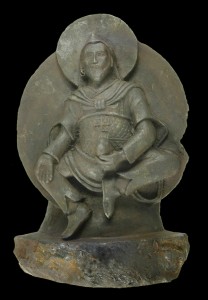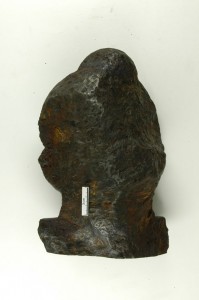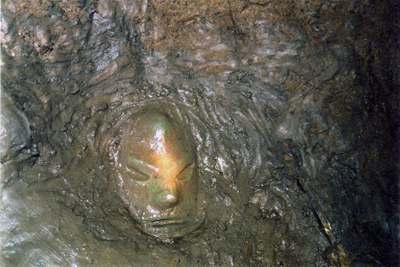 A 1,000-year-old Buddhist statue taken from Tibet by Nazi scientists is the first-known carving of a human figure made from a meteorite, newly-published research says.
A 1,000-year-old Buddhist statue taken from Tibet by Nazi scientists is the first-known carving of a human figure made from a meteorite, newly-published research says.
With stylistic links to the 11th century Bön culture, the sculpture is thought to depict the Buddhist god Vaisravana.
Despite measuring just 24cm in height, the object weighs 10kg (22lb). Now geochemical analysis by the University of Stuttgart, published in Meteoritics and Planetary Science, has revealed that the artefact is made of ataxite, a rare class of iron meteorite with a high nickel content.
‘The statue is the only known illustration of a human figure to be carved into a meteorite,’ said project-leader Dr Elmar Buchner, from the university’s Institute of Planetology. ’It was chiseled from a fragment of the Chinga meteorite which crashed into the border areas between Mongolia and Siberia about 15,000 years ago.’
He told CWA: ‘Stylistically, it is not absolutely typical for Buddhist or pre-Buddhist art, but during the 11th century there was a style of religious art in the Himalayan area, that can be described as a hybrid style between the two. It was called Bön culture, and this figure is typical of that style.
 There are similar figurative illustrations of gods – and also of local dignitaries – from the 11th century, made from wood, stone or other material – but not of a meteorite!’
There are similar figurative illustrations of gods – and also of local dignitaries – from the 11th century, made from wood, stone or other material – but not of a meteorite!’
Called the ‘Iron Man’, the statue was brought to Germany by an SS-backed expedition investigating the origins of Aryanism in Tibet in 1938-1939. It is not known exactly how or where the statue was found, but the large swastika carved into the centre of the figure – an ancient symbol representing good fortune – may have encouraged the team to take it with them. After decades in a private collection, the artefact became available for study following an auction in 2009.
Meteorites have inspired veneration in a number of cultures, from Inuits in Greenland to the aboriginal peoples of Australia. The Black Stone in the Kaaba (the building circled by Muslim pilgrims during the Hajj) at Mecca is also believed to be a stony meteorite.





No comments:
Post a Comment